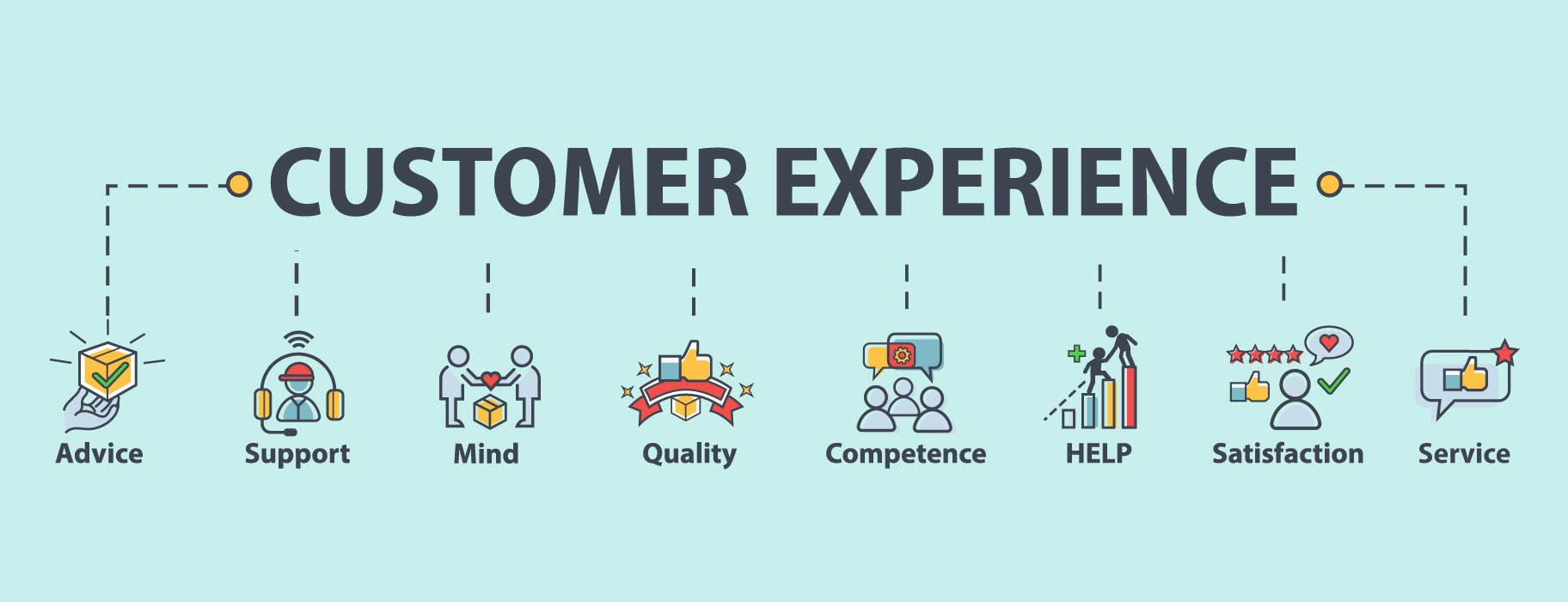In the dynamic landscape of modern business, the importance of customer experience cannot be overstated. From shaping brand perception to influencing customer loyalty, the journey a customer undertakes with a company plays a pivotal role in its success. Let’s delve into the importance of customer experience and understand why it has become the cornerstone of business strategies worldwide.
The Importance of Customer Experience

A. Definition of Customer Experience
Customer experience refers to the overall impression a customer has of a brand, formed through every interaction and touchpoint throughout their journey. It encompasses not only the product or service itself but also the emotions and perceptions that arise during the entire customer lifecycle.
B. Significance in Business
In an era where choices abound, businesses must go beyond merely delivering products; they must craft memorable experiences. Customer experience has evolved from being a differentiator to a critical component for sustainable growth.
The Impact on Customer Loyalty
A. Building Trust through Positive Experiences
Trust is the foundation of any lasting relationship, and the business-consumer relationship is no exception. Positive experiences build trust, fostering loyalty and increasing the likelihood of repeat business.
B. Repeat Business and Referrals
Customers who have positive experiences are more likely to return and become brand advocates, leading to organic growth through word-of-mouth referrals. Customer loyalty is a powerful asset in a competitive market.
Key Elements of a Positive Customer Experience
A. Personalization
Customers appreciate personalized experiences that cater to their specific needs and preferences. From personalized recommendations to targeted communication, customization enhances the overall experience.
B. Efficient Problem Resolution
The ability to swiftly address and resolve customer issues is crucial. An efficient customer support system not only rectifies problems but also contributes to a positive perception of the brand.
C. Seamless Multichannel Experience
With consumers interacting through various channels, providing a seamless experience across platforms is imperative. A cohesive multichannel strategy ensures consistency and convenience.
Role of Technology in Enhancing Customer Experience
A. AI and Machine Learning Applications
Technological advancements have empowered businesses to leverage AI and machine learning for personalized interactions, predictive analytics, and enhanced customer understanding.
B. Chatbots and Virtual Assistants
Chatbots and virtual assistants play a vital role in providing instant support, answering queries, and guiding customers. They contribute to a round-the-clock positive experience.
Creating a Customer-Centric Culture
A. Employee Training and Engagement
Employees are the frontline ambassadors of a brand. Training them to understand and prioritize customer needs contributes to the establishment of a customer-centric culture.
B. Aligning Company Values with Customer Expectations
Companies must align their values with customer expectations to create a harmonious relationship. When values resonate, customers feel a deeper connection with the brand.
Measuring and Improving Customer Experience
A. Utilizing Customer Feedback
Feedback mechanisms, such as surveys and reviews, provide invaluable insights. Actively seeking and implementing customer feedback is crucial for continuous improvement.
B. Key Performance Indicators (KPIs)
Establishing and tracking key performance indicators related to customer experience allows businesses to quantify success and identify areas for enhancement.
Challenges
A. Identifying Pain Points
Recognizing common challenges in delivering exceptional customer experiences is the first step toward overcoming them. Identifying pain points allows for targeted improvements.
B. Overcoming Common Obstacles
Addressing challenges head-on and implementing solutions ensures a proactive approach to overcoming obstacles, leading to sustained positive customer experiences.
Adapting to Changing Consumer Behavior
A. Trends Shaping Customer Expectations
Understanding evolving consumer behavior is paramount. Identifying and adapting to emerging trends enables businesses to stay relevant and meet evolving expectations.
B. Staying Ahead of the Curve
Proactive businesses anticipate changes rather than react to them. Staying ahead of the curve is crucial for maintaining a competitive edge in the market.
Global Perspectives on Customer Experience
A. Cultural Variances in Expectations
Customer expectations vary across cultures. Recognizing and respecting these differences is essential for providing a globally inclusive and satisfactory customer experience.
B. Cross-Cultural Considerations
Tailoring strategies to accommodate diverse cultural expectations ensures that businesses resonate with a broad spectrum of consumers globally.
The Financial Impact of Superior Customer Experience
A. Increased Revenue and Profitability
Investing in customer experience yields tangible financial benefits. Satisfied customers are more likely to make repeat purchases, contributing to increased revenue and profitability.
B. Long-Term Economic Benefits
The financial impact extends beyond immediate gains, with long-term benefits including brand loyalty, positive reviews, and a sustainable customer base.
Future of Customer Experience
A. Anticipating Trends and Innovations
Remaining attuned to future trends and innovations is vital. Businesses that proactively embrace change are better positioned to shape the future of customer experience.
B. Evolving Strategies for Tomorrow
As technology and consumer behavior evolve, so must customer experience strategies. Continual adaptation ensures that businesses stay ahead in an ever-changing landscape.
The Importance of Customer Experience in Online and Offline Business Models
A. E-commerce and Customer Satisfaction
In the online realm, customer experience is critical. Navigating e-commerce platforms should be intuitive, and customer support should be readily available for a seamless experience.
B. Physical Stores and Personalized Experiences
Brick-and-mortar stores can excel by providing personalized in-store experiences, creating a sense of community, and catering to individual preferences.
Case Studies with Record-Breaking Results
-
Amazon: Mastering Personalization for Customer Loyalty
Amazon has consistently set the benchmark for customer experience by leveraging personalization at scale. Through AI and machine learning, Amazon tailors recommendations for each user, leading to a record-breaking surge in sales and customer loyalty. In 2020, their Prime Day alone generated $10.4 billion in revenue. The personalized shopping experience Amazon provides is a prime example of how technology can be harnessed to enhance customer satisfaction and repeat business.
-
Zappos: Redefining Customer Service
Zappos, renowned for its exceptional customer service, set a new standard by treating every customer interaction as an opportunity to build a relationship. Their commitment to resolving issues without time limits led to a record-breaking 10-hour customer service call in 2016, exemplifying their dedication to customer satisfaction. This legendary approach not only boosted their customer loyalty but also positioned Zappos as a leader in customer-centric business practices.
Influencer Quotes & Tweets For The Importance Of Customer Experience
- Shep Hyken, a customer experience expert, tweeted:
“Customer experience isn’t just about fixing problems, it’s about creating emotional connections. Every touchpoint is an opportunity to build loyalty.”
This aligns perfectly with businesses like Zappos and their approach to creating a customer-first culture that goes beyond traditional customer service.
- Annette Franz, an acclaimed customer experience thought leader, shared:
“When businesses invest in their customers’ journeys, they invest in their own success. Your customer’s experience is the foundation of long-term growth.”
Franz’s insights underscore the importance of building trust and long-term relationships through positive experiences, which directly impact customer loyalty and retention.
Case Study Highlights with Record-Breaking Outcomes
- Tesla: Seamless Multichannel Experience Tesla revolutionized the automotive customer journey by blending online and offline experiences. From personalized online configurations to a seamless in-store experience, Tesla created a customer-centric model that resulted in over 422,875 vehicle deliveries in Q2 2023 alone—demonstrating how crucial an integrated multichannel experience is for businesses aiming for explosive growth.
- Airbnb: Globalizing Customer Experience Airbnb’s focus on global customer experience, respecting cultural differences, and delivering personalized service at scale helped them surpass 1 billion guest arrivals by 2022. Their efforts to accommodate diverse expectations have made them a global leader, proving that tailored experiences can lead to record-breaking success.
Influencer Insights
Blake Morgan, a customer experience futurist, remarked:
“Personalization, speed, and consistency—these are the pillars of modern customer experience. Companies that get this right will break records and transform industries.”
Tesla and Amazon’s customer-centric models, built on these very principles, exemplify how such strategies drive unprecedented growth and customer loyalty.
These case studies and influencer insights underscore the transformative power of customer experience. From driving revenue to building lasting relationships, businesses that prioritize customer satisfaction are positioned to set new industry records and shape the future of commerce.
Conclusion
Customer experience is a multifaceted aspect that profoundly influences the success of businesses. From the impact on loyalty to the role of technology and global considerations, each element plays a crucial role.
Businesses must prioritize and invest in creating exceptional customer experiences to thrive in today’s competitive landscape. Embracing innovation, fostering a customer-centric culture, and learning from both successes and failures are key to sustained success.
For a firsthand experience of revolutionizing customer interactions, request a demo from AIM Technologies today. Elevate your business with cutting-edge solutions that prioritize customer satisfaction.
FAQs
How does customer experience differ from customer service?
- While customer service is reactive, addressing specific issues, customer experience is holistic, encompassing every interaction a customer has with a brand throughout their journey.
Can small businesses afford to invest in customer experience?
- Absolutely. Customer experience investments need not be extravagant. Simple, thoughtful gestures and a focus on personalization can significantly enhance the customer journey for small businesses.
Is technology the only factor influencing customer experience?
- No, technology is just one aspect. Employee training, company culture, and aligning values with customer expectations are equally vital in shaping a positive customer experience.
How can businesses measure the ROI of customer experience efforts?
- Key Performance Indicators (KPIs) such as customer satisfaction scores, customer retention rates, and Net Promoter Score (NPS) are effective metrics for measuring the ROI of customer experience initiatives.
What role does storytelling play in enhancing customer experience?
- Storytelling creates emotional connections. Sharing brand stories that resonate with customers fosters a sense of connection and loyalty, contributing to an enhanced overall experience.




